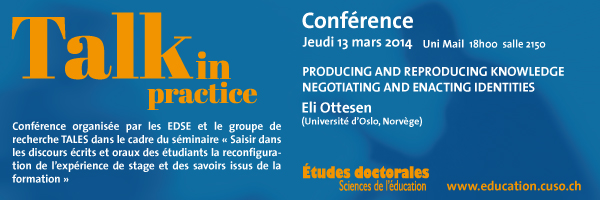Talk in practice: producing and reproducing knowledge; negotiating and enacting identities

Talk in practice: producing and reproducing knowledge; negotiating and enacting identities
Eli Ottesen
Université d'Oslo, Norvège
Jeudi 13 mars 2014 - 18h - Uni Mail - salle 2150
Résumé
In this lecture, talk (as verbal interaction) is explored as the central tool that mediates the relationship between the individual and the world. Human discourse serves a double function in social activities: It functions as a tool and a sign. As a tool, talk is externally oriented; that is, through discourse actors may influence and change their objects of activity. As a sign, talk turns inward; it is “a means of internal activity aimed at mastering oneself” (Vygotsky, 1978, p. 55). However, the two are mutually linked. Vygotsky (1978) uses the notion of internalisation to explain the processes through which social operations are psychologically reconstructed. The prefix “re-” is important; it indicates that culture is not transmitted into minds. Rather, in the developing person, a qualitative transformation takes place; in internalisation processes the sense and meanings of contextual information are transformed into concepts that have the function of mediating activity. Human interaction constitutes a process of forming and re-forming the psychological instruments regulating the relationships between individuals and the world, allowing for actions in/on the world, and also for conceptual thinking as a special form of social practice through which we,as it were, act on ourselves. It is in controlled outward actions, through deeds or speech, that we develop understandings of ourselves in ways that are considered legitimate to ourselves and to others (Shotter, 1993).
18 février 20142014
